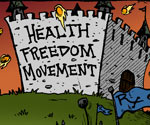The Astonishing Range of Vitamin D3 Benefits
| Share on Facebook | Share on Twitter | Share on Google+ |
For nearly 80 years, nutritional scientists believed that vitamin D3 benefits were mostly limited to preventing a childhood bone disease called rickets. Then medical researchers observed that vitamin D3 was an essential co-factor of calcium and phosphorous in fighting osteoporosis. And in the last ten years, nutritional scientists have found vitamin D3 benefits in fighting a wide range of chronic health conditions.
Nearly every adult can benefit from taking 1,000 to 2,000 IU of vitamin D3 every day, or up to 5,000 IU of vitamin D3 a day if deficient. Here are just a few of the conditions vitamin D3 helps prevent when taken in an appropriate dosage.
Vitamin D3 Psoriasis Benefits
Psoriasis is a disease caused by a reaction of the skin to signals from the immune system. Skin cells multiply at a rate up to 1,000 times faster than normal, forming itchy, scaly, reddened patches, as if the skin were trying to heal over damage caused by infection. Fighting infection, of course, is not the only function of the skin. The skin also makes vitamin D3.
When the skin is making a lot of vitamin D3, a group of skin cells known as keratinocytes functions more slowly. The skin does not need to make more keratinocytes to make more vitamin D3. Korean researchers have learned that skin that has higher levels of vitamin D3 grows more slowly, partially offsetting the abnormal response to the immune system.
If you are just using vitamin D3, psoriasis will not necessarily automatically go away. Vitamin D3 does not cure psoriasis. It just stops some of the itching, scaling, and redness—and isn't that what you want a psoriasis treatment to do?
Up to 1,000 IU of vitamin D3 a day, or up to 5,000 IU per day during winter if you live in temperature or cold climate, will help other treatments for psoriasis work much better and give you much more complete relief.
Vitamin D3 and Cancer
Australia is a very sunny country. Australian skin cancer rates are the highest in the world. About 20 years ago the Australian National Health Service started a campaign to encourage every Australian to use sunblock and to spend more time indoors in an effort to reduce the numbers of people developing skin cancer. The result? Melanoma rates went up, not down.
The reason is that sunblock stopped sun damage, but it also stopped the skin's production of vitamin D3. With a new understanding of the relationship of vitamin D3 and cancer, the Australian Health Service changed its campaign.
Vitamin D3 levels are known to be related to risks of all cancers. There is no one kind of cancer that is more or less susceptible to vitamin D3. Higher vitamin D3 levels are associated with slower growth of tumors and faster apoptosis, or cell death, of cancer cells, in the test tube, and in clinical trials involving real people. But there are still many unanswered questions about using vitamin D3 as a supplement to prevent cancer.
In fact, studies are only recently showing that taking vitamin D3 may prevent breast cancer in women. The reason the scientific findings have been slow to emerge is that the level of vitamin D3 needed to prevent serious bone problems is about 200 IU a day, and the level of vitamin D3 needed to lower breast cancer rates is about 1,100 IU per day. Preventing cancer may simply take a lot more vitamin D3 than has ever been recommended in the past. Up to 5,000 IU a day is safe, and may be cancer-preventative. If you have active cancer, check with your doctor before taking vitamin D3, since either the cancer itself or an overdose of vitamin D3 can cause bloodstream calcium levels to go dangerously high.
Vitamin D3 and Weight Loss
Everybody would rather just take a pill than do a diet to lose weight. When it comes to vitamin D3 and weight loss, there are indications it helps—but you will have to diet! But if you both diet and take vitamin D3, you will enjoy some really important advantages:
- Vitamin D3 increases the cardiovascular benefits of weight loss.
- Vitamin D3 slightly increases the proportion of weight loss due to fat, rather than muscle.
- Vitamin D3 helps stop "leaky gut syndrome," reducing weight gain due to fluid retention after reactions to food.
The important thing to know about vitamin D3 and weight loss is that if all you do is take vitamin D3, and you don't change your eating habits, there is no evidence that you will magically lose weight. But if you eat less, vitamin D3 multiples the benefits of losing weight throughout your body.
Vitamin D3 and Depression
Scientists really aren't sure whether people with low vitamin D levels get depression or people who are depressed don't get out in the sun so their bodies can make vitamin D. What is clear from the scientific research, however, is that people over the age of 60 who are the most mentally alert have the highest bloodstream levels of vitamin D, and that in adults aged 18 to 30, low levels of vitamin D3 are associated with mild and major depression.
The relationship between vitamin D3 and depression is clear during the winter among people who live in snowy climates, and in summer among people who live in places where people retreat to dark, air conditioned indoor spaces during extreme heat. But since vitamin D3 deficiency causes many other problems, it makes sense for people who have depression to take supplements to prevent deficiency.
Vitamin D3 and Pregnancy
Every pregnant woman needs additional vitamin D3. And since all but a few brands of cod liver oil carry the risk of heavy metal contamination, the best supplemental vitamin D3 is pill or tablet form.
Taking up to 2,000 IU of vitamin D3 a day during pregnancy, along with daily supplementation of up to 800 mg of calcium (in at least two doses taken at different times during the day) and 400 mg of magnesium can help prevent preeclampsia, the dangerous condition of high blood pressure that can threaten the lives of both mother and unborn child.
Selected References:
Kim SK, Park S, Lee ES. Toll-like receptors and antimicrobial peptides expressions of psoriasis: correlation with serum vitamin D level. J Korean Med Sci. 2010 Oct;25(10):1506-12. Epub 2010 Sep 17.
Schwartz GG, Eads D, Rao A, Cramer SD, Willingham MC, Chen TC, Jamieson DP, Wang L, Burnstein KL, Holick MF, Koumenis C. Pancreatic cancer cells express 25-hydroxyvitamin D-1 alpha-hydroxylase and their proliferation is inhibited by the prohormone 25-hydroxyvitamin D3.Carcinogenesis. 2004 Jun;25(6):1015–26. Epub 2004 Jan 23.
Wactawski-Wende J, Kotchen JM, Anderson GL, Assaf AR, Brunner RL, O'Sullivan MJ, Margolis KL, Ockene JK, Phillips L, Pottern L, Prentice RL, Robbins J, Rohan TE, Sarto GE, Sharma S, Stefanick ML, Van Horn L, Wallace RB, Whitlock E, Bassford T, Beresford SA, Black HR, Bonds DE, Brzyski RG, Caan B, Chlebowski RT, Cochrane B, Garland C, Gass M, Hays J, Heiss G, Hendrix SL, Howard BV, Hsia J, Hubbell FA, Jackson RD, Johnson KC, Judd H, Kooperberg CL, Kuller LH, LaCroix AZ, Lane DS, Langer RD, Lasser NL, Lewis CE, Limacher MC, Manson JE., Women's Health Initiative Investigators Calcium plus vitamin D supplementation and the risk of colorectal cancer. N Engl J Med. 2006 Feb 16;354(7):684–96.
Wilkins C, Sheline Y, Roe C, Birge S, Morris J. Vitamin D deficiency is associated with low mood and worse cognitive performance in older adults. Am J Geriatr Psychiatry.2006;14:1032–1040. doi: 10.1097/01.JGP.0000240986.74642.7c.
-
Skin CareMen Skin Care
-
Free ResourcesFree eBooks
-
The physician should not treat the disease but the patient who is suffering from it.Maimonides
-
Featured Health SupplementTotal Balance
 contains approximately one thousand, two hundred and seventy five times LESS lead than 1 tablet of the Vitamin Shoppe product.
contains approximately one thousand, two hundred and seventy five times LESS lead than 1 tablet of the Vitamin Shoppe product.
-



















